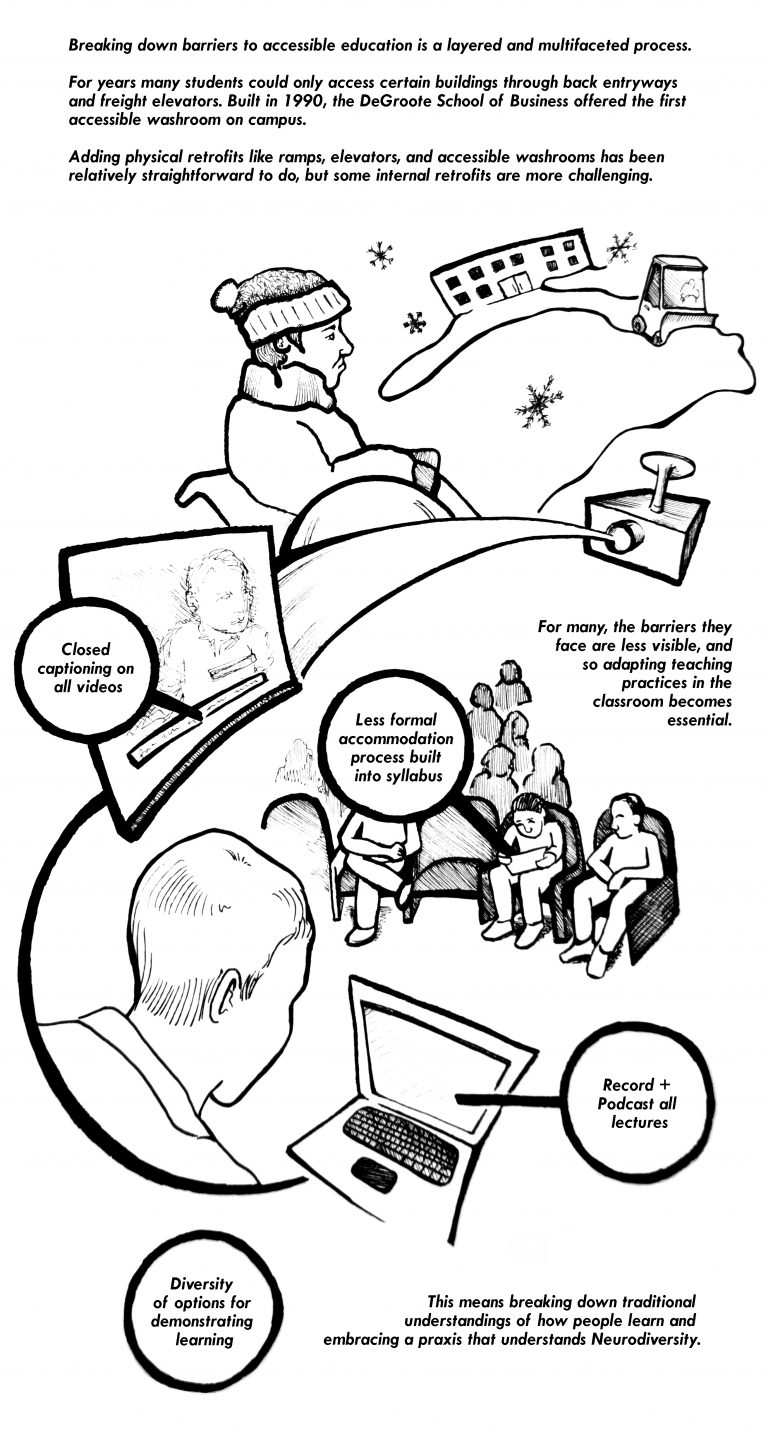10 Teaching and Learning: Accessible Online and Technology-Enabled Learning

Accessible Digital Content Training for McMaster
The Faculty of Science, in partnership with the Equity and Inclusion Office and Library Accessibility Services, has migrated and updated the Accessible Documents Webinar. Now called the Accessible Digital Content Training, this resource has been moved to the Pressbooks platform to facilitate open access, and expansion of its content for all McMaster community members. New sections, including the 7 Core Skills of Digital Accessibility, Accessibility in Pressbooks, Creating Accessible PDFs, and Creating Accessible ePubs, have been added to continue to support digital accessibility on campus.
Contributors: Equity and Inclusion Office, Library Accessibility Services, and Faculty of Social Sciences
MacPherson Institute: Advancing Accessibility Through Training Opportunities
Over 2020-2021 the MacPherson Institute (MI) delivered a number of synchronous and asynchronous training opportunities that focused on, or included, accessibility and inclusion work, including the Teaching and Learning Forum, a Blended Learning Guide, and a new Learning to Teach Online course. In addition, MI added new training on editing and captioning videos in MacVideo, and integrated SensusAccess, an online alternative format conversion tool free to members of the McMaster community, into Avenue to Learn. MI also offered training for SAS, librarians, and staff on accessibility tools in Avenue.
Contributors: The MacPherson Institute
Universal Design for Learning During Teaching and Learning Month
In May 2021, during Teaching and Learning Month, we (Devon and Sabrina) taught a series of three practice-based workshops for faculty and staff on topics related to making students’ experiences of McMaster’s learning management system – Avenue to Learn – more accessible. The topics included creating accessible content, implementing student accommodations, and applying Universal Design for Learning (UDL) principles in Avenue.
Contributors: Devon Mordell and Sabrina Kirby, The MacPherson Institute
EdTech Rover Expert Program in the Faculty of Social Sciences
Experience has shown that the auto-captioning results of class recordings or videos are often not 100% accurate. Since spring 2021, the Faculty of Social Sciences has implemented a team of ‘Technology Rovers’ who provide a captioning correction service to instructors for the rich media they create and post in virtual or online courses. Instructors don’t have the time or resources to correct these mistakes and those errors negatively affect the experience of students who rely on captions to participate. Having a dedicated team, often comprised of current students or graduates of the discipline with expertise in the curriculum language, makes a high standard of captioning possible and alleviates this work burden from instructors. It also ensures AODA compliance for rich-media delivery of course content.
The Technology Rovers also provide real-time classroom supports, both in-person and in the virtual classroom, providing instructors with a support system that enables them to focus on teaching, and not technical troubleshooting. Equally, the students in class feel supported because they have a dedicated point person (the EdTech Rover Expert) to help them navigate any technology issues in-class.
The caption correction service is directly tied to success criteria and standards in the Web Content Accessibility Guideline (WCAG) 1.2, on Time-based Media, which are the standards we are responsible for implementing under the Accessibility for Ontarians with Disabilities Act (AODA).
Contributors: Office of the Dean, Faculty of Social Sciences Educational Technology “Rovers”: (Lead) Samantha Price (Anthropology PhD Candidate), Vikizitha (Vix) Moyo (Labour Studies Graduate, MA), Sarah Szymanski (Sociology PhD Candidate), Gum-Ryeong Park (Health Aging & Society PhD Candidate), Mark Terpstra (Economics Graduate, MA), Sarah May Lindsay (Sociology PhD Candidate), and Nick Marquis (Educational Technologies Consultant)
Remediation of Course Content for Accessibility in Science Program
The Remediation of Course Content for Accessibility in Science Program (RCCAS) in the Faculty of Science, funded by the Inclusion, Diversity, Equity, Accessibility and Sustainability (IDEAS) grant and supported by the Career Access Professional Services (CAPS) program within the Student Success Centre was launched in 2021. A team of nine students was trained to complete audits and remediation efforts of course content and course outlines for Accessibility for Ontarians with Disabilities Act (AODA) compliance. This team also successfully supported the migration of Microsoft Teams recordings to MacVideo in the Fall 2021 term to ensure captions were available for students on recorded lectures.
Contributors: Faculty of Science, MacPherson Institute, Student Success Centre, Equity and Inclusion Office
DeGroote’s Teaching and Learning Services
DeGroote Teaching and Learning Services is a newly established unit that provides teaching and learning and educational development support to Degroote faculty members and instructional staff. During 2020-2021, we have created several accessibility resources to support our instructors when creating digital learning experiences, most notably, when teaching in online and technology-enabled environments.
Examples of accessibility-centric resources that we have developed include:
- The DeGroote School of Business Avenue Template: This is a brand-new master course shell that models key web accessibility practices such as using headings to add logical and visual structure, using list formats to add semantic structure, and inserting formatted and descriptive links to support users’ perception.
- Virtual Guidebooks for Teaching Teams: Supported by the eCampus Pressbook platform, virtual guidebooks include accessible content by including features such as alternative text for images, multimedia material, appropriate colour contrast, and tables that contain data only.
- Accessibility Training/Support: In partnership with the Equity and Inclusion Office and the Faculty of Science, training is offered to instructors on the 7 Core Skills for Accessibility when creating teaching materials. Consequently, instructors are supported to ensure that recorded virtual classes include accurate captions and transcripts.
Contributors: DeGroote’s Teaching and Learning Services, Nidia Cerna, Amy Pachai, Carlie Soares, Irina Ghilic, and Neil Kotch (Continuing Education Development Team), the Faculty of Science, and the Equity and Inclusion Office

